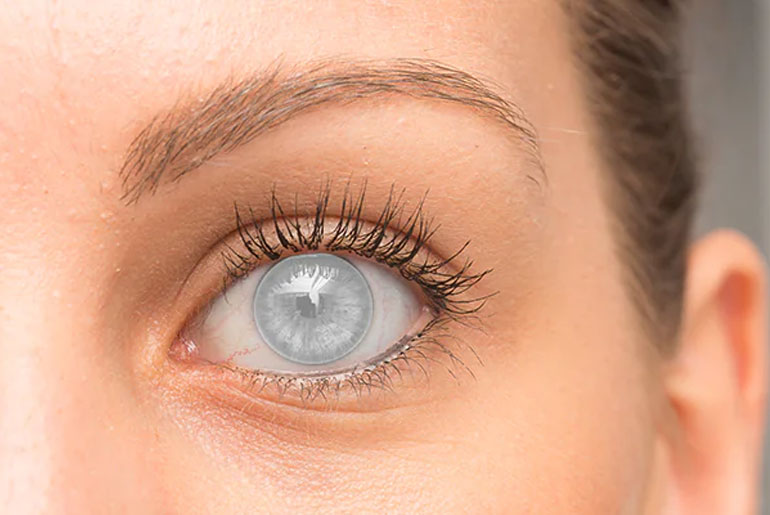Corneal damage refers to injury or deterioration of the cornea, the eye’s outer layer responsible for focusing light. This damage can result from infections, trauma, dry eyes, or exposure to harmful conditions. Common symptoms include redness, pain, blurry vision, and light sensitivity. Treatment options vary depending on the cause and severity, including medications, lubricating drops, and surgical interventions like corneal transplants. Prompt medical attention is essential to prevent further damage and preserve vision.
Types of Corneal Damage:
- Corneal Abrasions: Scratches or scrapes on the corneal surface, often caused by foreign objects, contact lenses, or trauma.
- Corneal Ulcers: Open sores on the cornea, often resulting from infections or severe dry eyes.
- Corneal Dystrophies: Genetic disorders causing progressive damage to the corneal layers.
- Keratoconus: A condition where the cornea thins and bulges into a cone shape, affecting vision.
Causes:
- Infections: Bacterial, viral (like herpes simplex), or fungal infections can lead to inflammation and ulcers.
- Trauma: Injuries from foreign objects, chemicals, or accidents.
- Dry Eye Syndrome: Insufficient tear production can lead to corneal damage and discomfort.
- Exposure: UV radiation, wind, or smoke can damage the corneal surface.
Symptoms:
- Redness and pain
- Blurry or decreased vision
- Sensitivity to light
- Excessive tearing or discharge
Treatment:
- Medications: Antibiotic or antiviral eye drops for infections, lubricating drops for dry eyes.
- Surgical Interventions: Corneal transplants or surgeries to correct structural issues or replace damaged corneal tissue.
- Protective Measures: Using sunglasses, avoiding irritants, and proper contact lens hygiene to prevent further damage.
Dos:
- Consult an Eye Care Professional: Seek immediate advice from an eye care specialist if you experience symptoms of corneal damage. Follow their guidance for treatment and recovery.
- Discontinue Lens Use: Stop wearing contact lenses until you receive clearance from your eye care professional. Switching to glasses may be necessary during the healing process.
- Use Prescribed Medications: Follow your eye care professional’s instructions regarding medications, such as eye drops or ointments, to aid in the healing of the cornea.
- Maintain Proper Hygiene: Wash your hands thoroughly before touching your eyes or handling contact lenses. Keeping hands clean helps prevent infections.
- Protect Your Eyes: Avoid exposing your eyes to irritants, including smoke, dust, or harsh chemicals. Wearing protective eyewear may be beneficial.
- Follow a Regular Cleaning Routine: If you are advised to continue using lenses after recovery, follow a strict cleaning and disinfection routine as prescribed.
- Monitor Symptoms: Keep track of any changes in your symptoms or vision and report them to your eye care professional promptly.
- Attend Follow-Up Appointments: Ensure you attend all follow-up appointments to monitor the healing progress and adjust treatment as necessary.
- Avoid Rubbing Your Eyes: Rubbing can exacerbate irritation and delay healing. Use artificial tears if needed to keep your eyes moist and comfortable.
Don’ts:
- Do Not Resume Lens Wear Prematurely: Avoid putting lenses back in before your eye care professional confirms that your eyes have healed completely.
- Avoid Using Old or Contaminated Solutions: Do not use expired or contaminated contact lens solutions. Always use fresh, recommended solutions.
- Don’t Sleep in Contacts: Unless specifically advised otherwise, avoid wearing contact lenses while sleeping to reduce the risk of further irritation.
- Avoid Self-Medicating: Do not use over-the-counter eye drops or treatments without consulting your eye care professional, as they may not be suitable for your condition.
- Don’t Expose Eyes to Water: Avoid swimming, showering, or any activities where your lenses might come into contact with water to prevent infections.
- Do Not Share Lenses: Never share contact lenses with others, as this can lead to contamination and exacerbate eye issues.
- Avoid Makeup: Refrain from applying makeup around your eyes until your cornea has healed, as it can introduce bacteria and irritants.
- Do Not Ignore Symptoms: If you experience increased pain, redness, or vision changes, do not ignore these symptoms. Seek prompt medical attention.
- Avoid Irritants: Stay away from environments or substances that could irritate your eyes, such as smoke or strong winds.
Taking these precautions can help in the recovery process and prevent further corneal damage while ensuring your eyes remain safe and healthy.
Disclaimer:
The information contained in this article is for educational and informational purposes only and is not intended as a health advice. We would ask you to consult a qualified professional or medical expert to gain additional knowledge before you choose to consume any product or perform any exercise.







